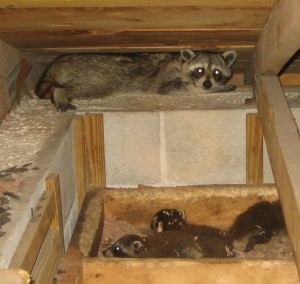How to Poison a Raccoon
 Poisoning raccoons is simply not the right answer to get rid of them. Note that I am not saying this because of animal rights. Or concern for animals that are considered a pest by many people. Instead, it is just not practical in the long run. There is a risk to your pets and your neighbor’s pets. In some areas, it may be even against the law in your city or town to poison a raccoon.
Poisoning raccoons is simply not the right answer to get rid of them. Note that I am not saying this because of animal rights. Or concern for animals that are considered a pest by many people. Instead, it is just not practical in the long run. There is a risk to your pets and your neighbor’s pets. In some areas, it may be even against the law in your city or town to poison a raccoon.
No one wants to see an animal suffer. However, when they are in your home, you will do almost anything to get rid of them. This picture shows a female raccoon with her pups in someone’s attic. If you poison these guys, they will die inside your home. The smell will be really bad. You will have to tear out all of the insulation. Then place new insulation just to get rid of the smell. The cost to the homeowner can be huge. It is important to get them out of the home quickly before a lot of damage is done.
So If Poison a Raccoon is Not the Right Answer, What is the Answer
Well, many people will try all kinds of things, usually from reading pages like this one. Forget loud noises, mothballs, and even trying to trap the raccoons. You might trap the young ones because they are inexperienced. But you are not going to get the more experienced adults to go into a trap regardless of what the pictures show.
The only way to get rid of them is to install heavy gauge wire mesh over the opening to the den which will block the raccoons from entering. You need to make sure that they are all out of the den, including the pups as well before you install the wire mesh over the opening. If you do not you risk that the pups might die inside your home and smell up your place. Worse the adults may tear your roof apart trying to get back inside to rescue their babies.
If they are not yet out, and the pups are old enough to travel on their own, install a one-way trap door over the opening to the den. This way all of the raccoons can get out of the den and then they will not be able to get back in. They usually leave every night to forage for food, but wait a few days to make sure that they are actually out of the attic before you replace the one-way trap door with something more permanent.
Precautions to Take
If you got to this page searching for how to poison a raccoon, and are now looking at installing a one-way trap door, you are on to the right approach. When you install the wire mesh screw nail it solidly into the roof or the studs around the opening. Use waterproof silicon caulking to plug the holes created by the screws to prevent water damage.
Use heavy gauge wire mesh for this purpose so that there is no possibility of the raccoons finding their way past the wire mesh or tearing it from the roof.
The feces of raccoons have microbes that can be harmful to humans. If you need to clean your attic, hire professionals to do this work who are wearing the proper protective clothing and breathing apparatus.
Install the wire mesh over all potential openings around your home so that birds, squirrels, skunks, and raccoons will not gain access sometime in the future. While it may cost you a few hundred dollars to have this work completed, it is well worth the effort compared to the damage and the aggravation that they can cause.
Not the Right Answer
Poisoning a raccoon or any other animal is simply not the right answer. Not only do they die a horrible death, but you also run the risk of poisoning other animals including pets. Your neighbors may get quite upset with you if their cat or dog is poisoned. Also, poison around the house is dangerous for kids as well so simply do not have it around
Finally, even if you were successful at poisoning this family of raccoons and removing their bodies, there are a hundred other raccoon families in the immediate area of your home that will come to visit once they realize that the den inside your home is vacant. Do the job right the first time and install a one-way trap door instead of trying to poison the raccoons inside your attic.
You can follow any responses to this entry through the RSS 2.0 feed. You can leave a response, or trackback from your own site.

September 6th, 2012 at 8:41 am
we are totally against poisoning any animal including raccoons. thank you for this post, because it really shows the right way to deal with this particular problem instead of just trying to poison raccoons.